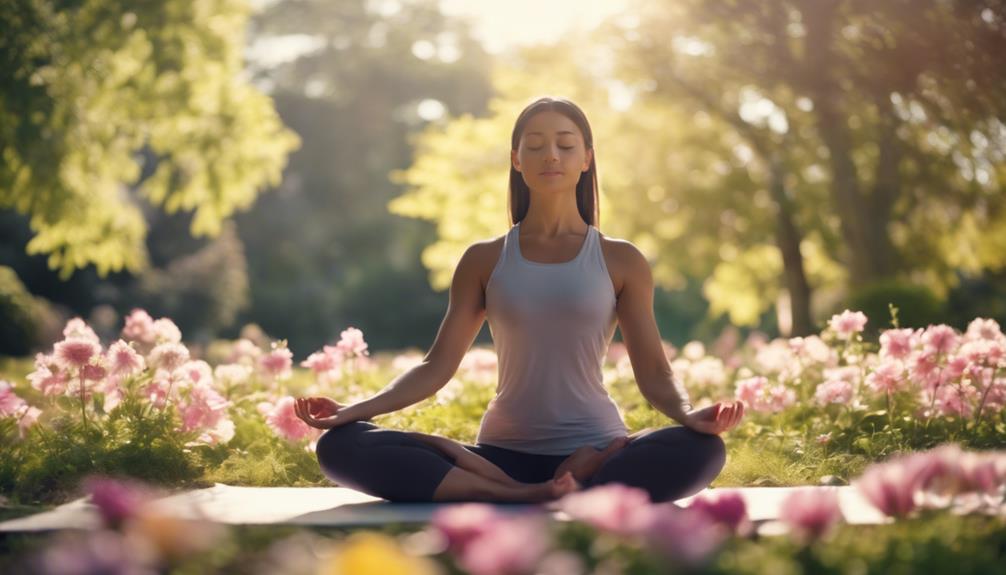The Benefits of Yoga for Mental Health
If you think yoga is just about stretching, think again. The benefits of incorporating yoga into your routine go far beyond physical flexibility.
Imagine a practice that not only helps you unwind but also strengthens your mental well-being in ways you never thought possible. From easing stress to fostering emotional balance, the impact of yoga on your mental health is profound.
But how exactly does it achieve this? Let's explore the transformative power of yoga on your mind and emotions.
Key Takeaways
- Yoga reduces stress and anxiety levels, promoting emotional well-being.
- Enhances mindfulness and focus, aiding in stress recognition and concentration.
- Fosters emotional balance and resilience for inner peace and self-acceptance.
- Improves sleep quality and mood, supporting overall mental health and personal growth.
Stress Reduction
To alleviate stress effectively, incorporating regular yoga practice into your routine can provide significant mental health benefits.
Yoga offers a holistic approach to stress reduction by combining physical postures, breathing exercises, relaxation techniques, and mindfulness practices.
Engaging in yoga helps you cultivate a mind-body connection, allowing you to become more aware of your thoughts, emotions, and physical sensations.
Through consistent practice, you develop the ability to observe stressful triggers without immediate reaction, fostering a sense of inner peace and resilience.
Anxiety Relief
Incorporating yoga into your routine can be a powerful tool for relieving anxiety and improving your mental well-being. When it comes to anxiety relief, yoga offers a holistic approach that combines physical postures, breathing techniques, and relaxation poses to help calm the mind and reduce stress levels.
Yoga Techniques for Anxiety Relief:
| Breathing Techniques | Relaxation Poses | Benefits |
|---|---|---|
| Deep Abdominal Breathing | Child's Pose | Reduces Stress |
| Alternate Nostril Breathing | Legs Up the Wall Pose | Calms the Mind |
| Diaphragmatic Breathing | Corpse Pose | Increases Relaxation |
| Ujjayi Breathing | Cat-Cow Pose | Improves Focus |
| Box Breathing | Standing Forward Fold | Enhances Mindfulness |
Mood Enhancement
Enhance your mood through the practice of yoga, experiencing a positive shift in your mental well-being and emotional state. Engaging in yoga can provide an energy boost, increasing your productivity levels and vitality. As you flow through yoga poses and focus on your breath, you may notice a surge in creativity and a spark of inspiration. This enhanced mood can lead to a more positive outlook on life and a greater sense of overall well-being.
Yoga has a unique way of balancing your emotions and uplifting your spirits, helping you navigate through life's challenges with a clearer mind and a lighter heart. By incorporating yoga into your routine, you create a space for joy and tranquility to flourish within you. The combination of movement, breath work, and mindfulness in yoga can help release tension, reduce stress, and cultivate a sense of inner peace. Allow yourself to tap into the mood-enhancing benefits of yoga and witness the transformative power it can have on your mental health and emotional resilience.
Emotional Balance
As you cultivate emotional balance through the practice of yoga, you'll discover a harmonious alignment between your inner feelings and external experiences. Yoga serves as a powerful tool for emotional regulation, allowing you to navigate the highs and lows of life with greater ease. By engaging in yoga practices that focus on mindfulness and breath awareness, you can learn to observe your emotions without judgment, fostering a sense of inner peace that transcends daily stressors.
Through yoga, you develop the ability to regulate your emotional responses, creating a buffer against the chaos of modern life. This newfound emotional resilience enables you to face challenges with a calm and centered mind, enhancing your overall well-being. As you delve deeper into your practice, you'll notice a shift in how you perceive and react to different situations, leading to a greater sense of clarity and emotional stability.
In cultivating emotional balance through yoga, you open the door to a life filled with inner peace and harmony, empowering you to embrace each moment with grace and equanimity.
Increased Mindfulness
By fostering increased mindfulness through regular yoga practice, you can cultivate a deeper awareness of your thoughts, emotions, and sensations. Mindfulness involves paying attention to the present moment without judgment. During yoga, the focus on mindful movement allows you to synchronize your breath with each posture, helping you stay grounded in the present. This present awareness created through yoga can extend beyond the mat and into your daily life. By being more mindful, you can learn to observe your thoughts and feelings without getting caught up in them, leading to a greater sense of clarity and calmness.
Engaging in yoga promotes present awareness by encouraging you to connect with your body and breath in the here and now. Through mindful movement, you can develop a profound understanding of the mind-body connection, fostering a sense of unity within yourself. This heightened awareness can aid in recognizing and addressing stressors more effectively, promoting emotional resilience and overall well-being. Embracing mindfulness through yoga offers a pathway to liberation from distractions and worries, allowing you to experience a deeper connection to yourself and the world around you.
Better Sleep Quality
Improving your sleep quality can be achieved through the practice of yoga, offering a natural and holistic approach to enhancing your restorative rest. Engaging in yoga can help calm your mind and relax your body, setting the stage for improved sleep patterns.
Here are some ways in which yoga can benefit your sleep:
- Stress Reduction: Yoga incorporates relaxation techniques that can lower your stress levels, making it easier to unwind before bedtime.
- Mindfulness Practice: By focusing on the present moment during yoga sessions, you can cultivate improved focus, which can translate into better sleep quality.
- Regulated Breathing: Yoga promotes deep breathing exercises that can help regulate your breathing patterns, preparing your body for a more restful sleep.
- Muscle Relaxation: Through various yoga poses, you can release tension in your muscles, allowing your body to fully relax and prepare for a night of quality sleep.
Improved Concentration
Enhancing your concentration levels can be a significant benefit of incorporating yoga into your routine, building upon the foundation of improved sleep quality that yoga provides. By engaging in yoga practices that focus on mindfulness and breath control, you can experience a noticeable improvement in your ability to concentrate. The meditative aspects of yoga help calm the mind, allowing you to enhance your focus and memory retention.
Yoga is known to boost attention and cognitive function, providing you with the tools to navigate through daily tasks with increased clarity and efficiency. The asanas and breathing techniques promote a sense of mental clarity that can lead to better decision-making and problem-solving skills. As you continue to practice yoga regularly, you may find that your ability to stay present and attentive in various situations improves, ultimately benefiting your overall mental performance.
Incorporating yoga into your routine can lead to a profound enhancement in your cognitive abilities, offering you a holistic approach to improving your concentration and mental acuity.
Boosted Self-Esteem
Embracing yoga as part of your routine can lead to a significant boost in your self-esteem, fostering a positive sense of self-worth and confidence. Engaging in yoga practices not only benefits your physical health but also has a profound impact on your mental well-being. Here's how yoga can help in confidence building and self-worth validation:
- Mindfulness Practices: Through yoga, you learn to be present in the moment, accepting yourself without judgment, which can enhance your self-awareness and appreciation for who you are.
- Body Positivity: Yoga encourages you to focus on what your body can do rather than how it looks, promoting a healthier relationship with your body and boosting your self-esteem.
- Achieving Personal Goals: Setting and achieving goals in your yoga practice can translate into a sense of accomplishment, reinforcing your belief in your abilities.
- Emotional Regulation: Yoga teaches you to manage stress and emotions effectively, leading to a more stable sense of self and increased self-worth.
Enhanced Resilience
With consistent practice, yoga cultivates a resilient mindset that empowers you to navigate life's challenges with strength and adaptability. Through yoga, you develop coping strategies that enhance your mental strength, allowing you to face difficulties with grace and determination. The practice of yoga encourages emotional regulation, enabling you to manage stress and anxiety more effectively. By learning to connect with your breath and body, you can cultivate inner peace amidst chaos, fostering a sense of calmness within yourself.
Yoga teaches you to embrace discomfort and uncertainty on the mat, translating these lessons into your daily life. This newfound resilience helps you bounce back from setbacks and adversity, viewing them as opportunities for growth rather than insurmountable obstacles. As you build mental fortitude through yoga, you become better equipped to handle life's inevitable ups and downs with grace and resilience. By incorporating the principles of yoga into your daily routine, you can enhance your ability to navigate challenges with a sense of inner strength and empowerment.
Sense of Calm
Cultivating a sense of calm through yoga practice can serve as a powerful tool in managing daily stressors and promoting overall emotional well-being. By incorporating relaxation techniques into your yoga routine, you can experience a profound sense of inner peace that can positively impact your mental health. Here are some ways in which yoga can help you achieve a greater sense of calm:
- Mindful Breathing: Focusing on your breath during yoga practice can help you center yourself and quiet the mind.
- Meditation: Integrating meditation into your yoga sessions can aid in reducing anxiety and fostering a tranquil state of mind.
- Yoga Nidra: This deep relaxation technique practiced at the end of a yoga session can enhance relaxation and promote emotional balance.
- Guided Imagery: Visualizing serene and peaceful scenes during yoga can help you release tension and cultivate a sense of calmness within.
Through these practices, yoga can become a sanctuary where you can find solace and rejuvenation, ultimately leading to a more serene and balanced mental state.
Mind-Body Connection
Establishing a strong mind-body connection is essential for enhancing your overall well-being and maximizing the benefits of yoga practice. Through practices like breath awareness and movement meditation, you can deepen your understanding of how your thoughts and emotions are interconnected with your physical body.
When you focus on your breath during yoga, you bring attention to the present moment, calming the fluctuations of the mind and allowing for a deeper connection between your body and mind.
Movement meditation, such as flowing through yoga poses with awareness and intention, helps to cultivate a sense of unity between your physical movements and mental state.
Overall Well-Being
To achieve overall well-being, prioritize integrating yoga into your daily routine to experience the multitude of benefits it offers for your mental health. Yoga provides a holistic approach to wellness, addressing not only the physical aspect but also focusing on mental and emotional well-being. Through regular practice, you can cultivate inner peace, which is essential for maintaining a balanced and healthy mind.
Benefits of Yoga for Overall Well-Being:
- Holistic Approach: Yoga takes a holistic approach to health, nurturing your mind, body, and spirit simultaneously.
- Inner Peace: By practicing yoga, you can cultivate a sense of inner peace and tranquility that can positively impact your overall well-being.
- Self-Care: Engaging in yoga is a form of self-care that allows you to dedicate time to your mental health and wellness.
- Relaxation: Yoga promotes relaxation through breathing techniques and mindfulness, helping you reduce stress and anxiety levels.
Prioritizing yoga in your routine can lead to a profound improvement in your overall well-being, fostering a sense of liberation and balance in your life.
Frequently Asked Questions
Can Yoga Help With Managing Symptoms of Specific Mental Health Disorders Such as Depression or Ptsd?
Yes, yoga therapy can be beneficial in managing symptoms of mental health disorders like depression or PTSD. The mind-body connection promoted through yoga practices can help reduce stress, improve mood, and enhance overall well-being.
Is There a Specific Type of Yoga Practice That Is More Effective for Improving Mental Health Than Others?
When it comes to yoga styles and their effectiveness on mental health, certain practices like Kundalini or Hatha can deepen the mind-body connection, enhancing the benefits for your overall well-being and mental clarity.
Are There Any Potential Risks or Contraindications for Individuals With Pre-Existing Mental Health Conditions Practicing Yoga?
When considering yoga with pre-existing mental health conditions, it's crucial to be aware of potential risks and contraindications. Taking precautions and following safety measures can help ensure a positive experience. Always prioritize your well-being.
How Long Does It Typically Take to Start Noticing the Mental Health Benefits of a Regular Yoga Practice?
You might feel like a superhero, but realistically, it can take a few weeks to a couple of months to start experiencing the mental health benefits of a regular yoga practice. Be patient with your progress.
Are There Any Specific Breathing Techniques or Meditation Practices Within Yoga That Are Particularly Beneficial for Mental Health?
Explore various breathing techniques and mindfulness meditation practices in yoga. These methods can significantly aid mental health by promoting relaxation, stress relief, and emotional balance. Consistent practice can lead to improved well-being and inner peace.
Conclusion
In conclusion, practicing yoga is a powerful tool for improving mental health. It can help you reduce stress, manage anxiety, enhance your mood, and bring a sense of calm to your mind and body.
So next time you're feeling overwhelmed, remember to roll out your yoga mat and find your inner peace. Who knew that bending and stretching could lead to such profound mental benefits?
Keep striking those poses and watch your mental well-being soar.











